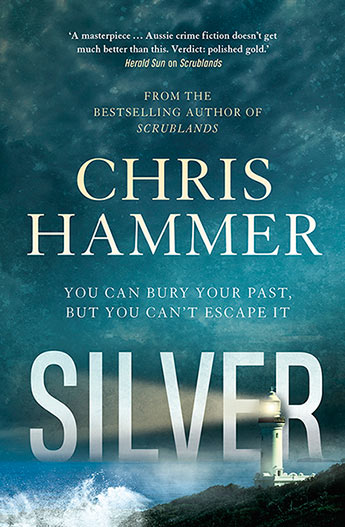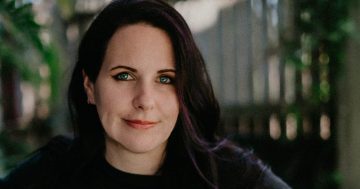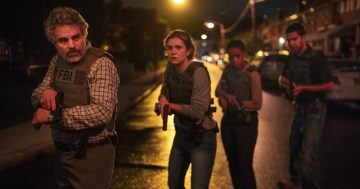
Chris Hammer at Broulee on the NSW South Coast. Photo: Mike Bowers.
Too few Australian writers can put “novelist” on their tax return. But former Press Gallery journalist and Canberra author Chris Hammer has proved that crime does pay with the publication of his second novel, Silver.
Set in the fictional North Coast town of Port Silver, “the next Byron Bay or Noosa”, Silver follows journalist and accidental detective Martin Scarsden, whom readers first met in Hammer’s wildly successful first novel, Scrublands.
Both books are murder mysteries, both centre on small communities under considerable stress and both explore the emotional story of a successful journalist who finds himself at a turning point in his life where the past intersects unavoidably with the present.
Hammer has had a journey of his own to get here. He reported for SBS from six continents, was chief political correspondent for The Bulletin, a senior writer for The Age and the Fairfax online political editor. But it was a redundancy that opened up the future.
“I’d written two non-fiction books that were well received but I didn’t make any money. Writers in Australia seldom do,” he says. “I went back to work and started writing Scrublands as a hobby and thought someone might publish it.”
They did.
At almost exactly the same time as he was made redundant from Fairfax, he had the book accepted by an agent and became the subject of a bidding war. Allen and Unwin published Scrublands which went on to sell more than 80,000 copies. Hammer was hailed as a pioneer of “Aussie noir”.

Silver takes Martin Scarsden back to his beachside home town. Image: Supplied.
Silver takes Scarsden back to his hometown with his new love, the slightly improbably named Mandalay Blonde. As a hard-boiled, nationally known investigative journalist he’s long ago left behind his painful childhood there and his damaged family.
But on arrival, Martin’s childhood best friend is found brutally murdered. Mandalay becomes a prime suspect and he has no choice but to get involved. The murders keep coming, and deep currents run strong as developers hover over the once-peaceful seaside community.
Hammer finds fiction liberating to write without the need to worry about defamation, fighting for space on the front page or protecting sources. There were, however, lessons to learn about internal consistency and planning.
“The logic of the plot is important in crime writing, Hammer says. “You write a lot of background material that’s not in the book because it’s important to know what other characters are doing at the same time as the protagonist is investigating.
“In Scrublands I wrote a really nice scene where Martin Scarsden was in a police station, watching the ABC’s 7 pm news bulletin. He goes out into the night where there’s a blood-red night sky from smoke that’s wreathing the town. Then my editor pointed out that since the story is set in summer, it would still be daylight at 7.30 pm.”
Hammer describes himself, grinning, as “a serial killer of darlings” who is not afraid to throw out huge chunks of writing that don’t work.
“There’s a saying among crime writers that you are either a plotter or a ‘pantser’, as in writing by the seat of yours. That’s me.
“I try to plot the book out and that would certainly be more efficient. But then you get a better idea. The plot and landscape evolve to fit each other, as do the characters. I like them to be nuanced, I don’t want goodies versus baddies, including Martin himself.
“He is far from a perfect character, but we do see him grow and change and that is very satisfying for me as a writer. That’s the emotional core of this book.”
Although these are murder mysteries, Hammer avoids excessive violence, and sex too for that matter.
“It’s there if it matters to the plot. But I think violence that’s suggested is far more powerful than hitting the readers in the face with it. If it’s gratuitous, it just gets in the road – better to let the readers’ imagination do the work.”
Hammer is writing the third Martin Scarsden book now. It will be set in Sydney, although Hammer thinks that might take him to the end of this particular emotional journey for his characters. But with his reputation as a crime writer steadily building, it’s far from the last we’ll hear from him.
“I’m earning enough from writing for it to be a career. I can call myself a writer without blushing. I’m determined to make the most of it,” he says.
Silver is published by Allen & Unwin.
Original Article published by Genevieve Jacobs on The RiotACT.












